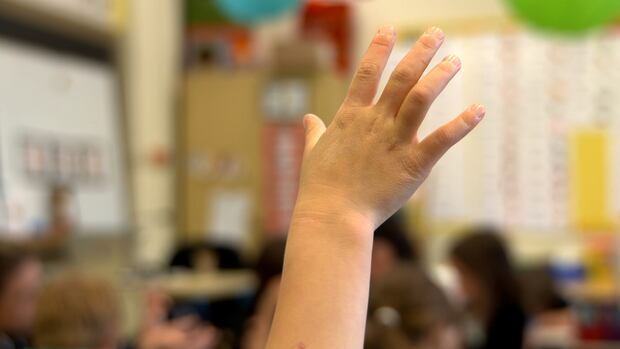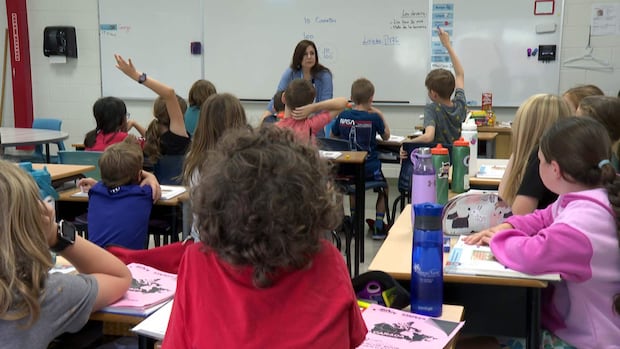New school year offers no relief for Canadian teachers amid ongoing shortages
Teachers cite stress, guilt and frustration as consequences


Back to school is a time for new beginnings, but elementary and secondary schools across Canada are still facing the ongoing issue of teacher shortages.
"[The] stress and frustration that I know is going to come when I won't have the resources I need, or don't have the support, because the system is not robust — it's not sustainable," said Gurpreet Bains, a learning support teacher at a high school in Surrey, B.C.
"It's just running on the kind-heartedness of the teachers," she told The Current's guest host Susan Ormiston.
Teachers in B.C. are not the only ones dealing with understaffed public schools.
Two weeks ago, Quebec's Education Minister Bernard Drainville announced that 5,704 teaching positions were still vacant.
The reasons for the shortage in Canada are numerous. In Quebec, a growing student population has caused challenges in the school system. In B.C., the decline in teachers has been linked to a range of issues including rising housing costs and teachers retiring early during the pandemic.
Bains said the shortage is driven by poor working conditions and lack of funding, leaving teachers like her "doing a lot more with a lot less."
"It's not a greedy teacher asking for more money, or it's not a teacher asking for more prep time. It's because it's needed."

Following the pandemic, Surrey schools superintendent Mark Pearmain said that "the biggest item that really has been hitting [them] is the population growth."
"We're growing as a system, not just in Surrey, but in British Columbia," said Pearmain, "We were able to recruit teachers from Ontario, Alberta and vice versa. But we're all in the same boat at this point in time."
Pearmain also says that teacher shortage is international — with colleagues in the U.K., Australia and "other Western nations" facing similar challenges.
This is coupled with the changing nature of employment — with remote work and flexible hours being options now, Pearmain says that people ask: "Do I want a traditional 9-to-5 job, or do I want some more flexibility?"
French teachers needed
Isabelle Alarie, a French teacher at Lester B. Pearson English School Board in Montreal, has seen the impact on students when teachers are called to substitute, and teach in subjects outside of their expertise.
"It has been an ongoing problem, especially in my field. There is a great shortage of French second-language teachers, and every year it's the same song and dance: 'We're looking for more teachers.'"
According to Alarie, a teacher's steady presence in the classroom creates routine and structure that motivates students to learn and thrive.
Without that, "the lack of structure and the lack of expertise will be very apparent, and the students will suffer," she said.
Judy Kelley, chairperson of the Lester B. Pearson School Board in Quebec, says there is a demand for French teachers across Canada that isn't being met.
"It's probably the largest challenge we have, is to find qualified French first- or second-language teachers," she said, noting there's a draw for some teachers into the college system.
Additionally, she says that fewer people are going into the teaching profession, "whether they specialize in French or they're from a French university and education program."
Impact on teachers
Staff shortages take a toll on teachers when they are forced to become "jacks of all trades," said Bains. If a colleague is away, other teachers at that school are asked to cover their classes if the school is unable to find a substitute.
"You are doing something else that you're maybe not familiar with. For example, I'm a language teacher as well. And I may be covering a colleague's math classroom or a P.E. [physical education] classroom or a metal shop workshop," said Bains.
Filling in for other teachers also takes Bains, who is a learning support teacher, away from her own students.
"This means that your most vulnerable learners, students with high needs and who need one-on-one attention are not getting it," said Bains.
"This is very stressful, not only on the students, families — many teachers will probably go under this guilt trip that, 'Hey, I'm here, I'm showing up, but I'm not doing my job right.'"
Finding solutions
Teacher recruitment is at the top of Pearmain's list of solutions to the shortage.
"We really strive to ensure that we have qualified teachers in front of our kids each time. We continue to try and find full-time folks because ideally, we'd like to have the consistency in front of the kids for every class that we can," he said.
He also says that metro schools are learning from schools in the North that have dealt with this issue for about a decade.
"The North has started trying signing bonuses, and retention bonuses, and they're meeting some success there."
Ontario supply teacher Matt Cote from the York Region District School Board said he believes retaining current teachers and recruiting new ones hinges on cultivating more respect for the teaching profession.
"To me, respect means looking at what responsibilities we're asking from [teachers], what resources we're providing them to meet those responsibilities, and making sure we're really setting them up for success in the best way possible," said Cote.
CBC reached out to the York Region District School Board and Ontario Ministry of Education for comment about the reasons behind teacher shortages and solutions to the problem but did not receive a response by publication time.
Alarie, too, said she wishes people had a better understanding of how complex and multifaceted teacher's jobs have become over the years. She said her job includes being "mentor, coach, advisor, troubleshooter and conflict manager" on top of teaching French.
"I think [aspiring] teachers are afraid of that workload because they know that, right now, it's not being respected, it's not being valued," she said.
"Yes, it's multifaceted, but it is so rewarding because of the bonds that you develop with the students."
Produced by Arman Aghbali



